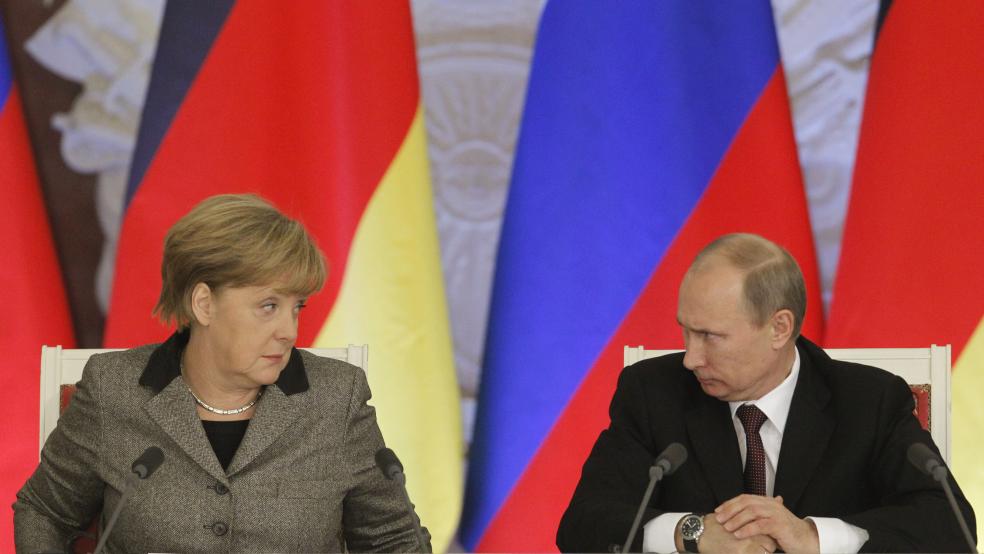President Obama’s weak response to Russia’s invasion of Crimea has elicited widespread scorn, with critics like Mitt Romney charging that the U.S. is constantly behind the curve of world events.
We are not alone.
Europe has had nearly a decade -- since Moscow cut off gas supplies to the region for the first time-- to ready itself for renewed Russian misbehavior, but has been caught as flatfooted as Obama. Instead of reducing their dependence on gas from Ukraine and Russia, the leaders of Western Europe have chosen to combat climate change. Instead of investing in secure energy, the EU has invested in green energy, driving up energy costs, reducing competitiveness, and allowing Putin to remain in the driver’s seat.
Russia today supplies 30 percent of Europe’s natural gas; half of that flows through Ukraine. In 2006, when the Kremlin first cut exports to the region, Siberian gas provided only 20 percent of EU consumption. Despite the obvious riskiness of depending on Moscow-controlled energy, Europe’s leaders failed to invest in domestic or politically secure alternative supplies.
Related: Russia’s Provocative New Act of Aggression in Ukraine
Eight years ago, alarmed by the first Ukraine skirmish, Europe’s leaders discussed adding nuclear power plants, developing other domestic supplies or tapping more politically reliable energy partners. Instead, the crisis passed, and accessing secure low-cost energy took second seat to a “greener” energy footprint.
In France, for instance, President Hollande has stood up firmly against fracking, telling French TV last year, "As long as I am president, there will be no exploration for shale gas in France." In October, a French court upheld a ban on fracking, meaning the country’s shale gas reserves – estimated at some 5 trillion cubic meters, some of the largest in Europe and about one-fifth U.S. reserves – remain untapped.
Hollande’s aversion to inexpensive indigenous energy is not confined to shale gas. He entered office pledging to cut France’s reliance on low-cost nuclear power from 75 percent of total electricity generation to 50 percent by 2025, and promising to close one of the country’s oldest nuclear power plants by year-end 2016. Industrial leaders in France have opposed Mr. Hollande’s program, predicting an end to France’s relatively cheap power, which they view as an important competitive advantage for the slow-growing country.
France is not unique; the green virus has infected Germany as well. Germany is Europe’s largest consumer of Russian gas. Germany, too, has resisted fracking, despite declining domestic gas production which will lead to higher imports and even though the practice has been in use there for some 50 years. Even traditional gas production is being stymied, opposed by environmentalists. There is some urgency behind efforts to allow fracking: a decade ago, 20 percent of the country’s natural gas was produced locally; that share has now dropped to 12 percent.
Related: Putin’s Oligarchs Are Key to War and Peace in Ukraine
One industry source says given Germany’s substantial shale gas reserves, fracking could help maintain that 12 percent share for the next 100 years. Ironically, not resorting to fracking will mean not only increased reliance on gas imports, most likely from Russia, but also higher coal consumption, which is likely to have a harsher environmental impact.
Like France, Germany has favored environmental goals over cheap and secure energy. As a result, electricity prices for households rose 80 percent in real terms between 2000 and 2012. One analysis claims that 6.9 million German households now spend more than 10 percent of their income on energy – living in “energy poverty.” Bjorn Lomborg of the Copenhagen Consensus Center charges this the “surcharge” from Germany’s investment in renewable energy means “more and more money…going from the poor to the rich” as “low-income tenants in the Ruhr area or Berlin…subsidize wealthy homeowners in Bavaria who put solar panels on their roofs.”
Lomborg claims that money is flowing into subsidizing expensive and uneconomic renewables instead of funding research into new technologies that could prove beneficial to the environment and the economy. He writes in an op-ed published in The Financial Times, “For solar alone, Germany has committed to pay subsidies of more than E100bn over the next 20 years, even though it contributes only 0.7 percent of primary energy consumption. The impact on the environment will be to delay global warming by a mere 37 hours by the end of the century.” Meanwhile, energy costs for German households now run 48 percent above the EU average.
Related: Does Putin Want to Carve Up Ukraine and Take the Spoils?
Lomborg also notes that overall, European energy costs have risen nearly 40 percent since 2005, while power prices in the U.S. have declined. Not only have prices increased, the region has become more dependent on outside suppliers, including Russia.
Will Europe reassess its enthusiasm for green energy in light of Putin’s aggression? Will they instead plow investment dollars into traditional oil and gas, actually reducing their dependence on Moscow? Surely EU leaders must be concerned about another cut-off of Ukraine gas. They must also be anxious that the continent’s competitive position has been compromised by its expensive energy; the International Energy Agency has predicted that Europe’s high energy costs could drive industries employing 30 million people out of the region.
Currently, it appears that talks concerning a new Black Sea pipeline – the South Stream --that would transport Russian gas to Central and Eastern Europe and that would bypass Ukraine, have broken down. It is estimated that when finished in 2018, the new line would supply 15 percent of Europe’s gas needs. The line is 50 percent owned by Gazprom, but needs approval from EU legislators. That go-ahead is currently on hold; maybe Europe is starting to wise up.
Top Reads from The Fiscal Times:






